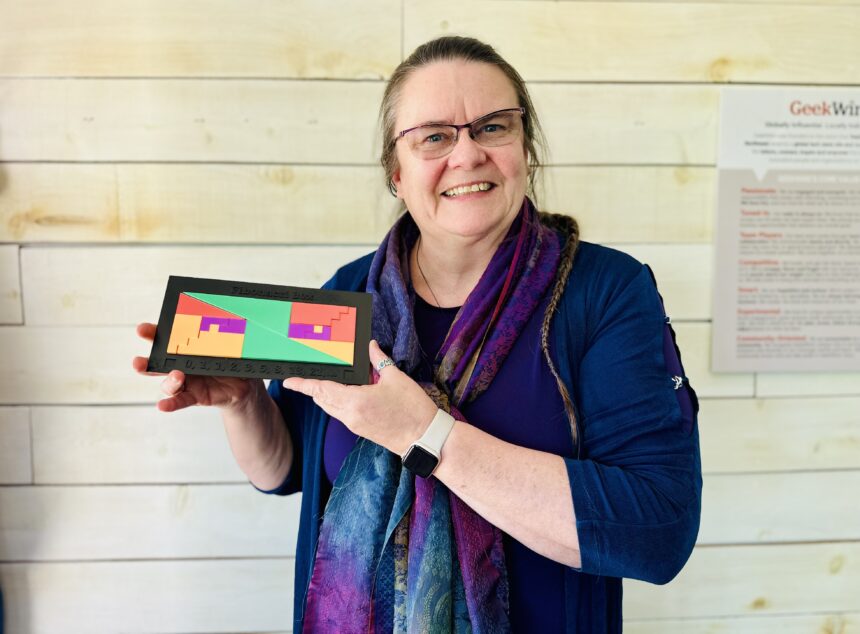Jenny Quinn travels with math in her backpack.
She unpacks it piece by piece: bright, 3D-printed shapes that click together into perfect rectangles. As she moves the Fibonacci sequence puzzle around, her eyes brighten and her hands quicken. She is both teacher and magician.
Quinn is the executive director of the Seattle Universal Math Museum (SUMM). She’s also a past president of the Mathematical Association of America and a professor of mathematics at the University of Washington, Tacoma. Her passion for math is contagious.
To Quinn, “math is everywhere,” and she couldn’t be more excited to share her love for it. From music to art to nature itself, she sees math woven through it all.
“It’s not just balancing your check book, and it’s not just arithmetic or algebra,” she told GeekWire. “It’s creating beautiful buildings. It’s music theory.”
Quinn joined SUUM as the executive director in June 2024. She describes her role as the “job I have trained my whole life for.”
Quinn was previously president of the Mathematical Association of America during COVID, where she authored a blog called Math in the Time of Corona and helped colleagues adapt to teaching online. “I built a lot of leadership skills,” she said, “and I saw that we have to promote math to more than the people who already love it.”
The mission of SUUM is to involve everyone. “If I get a five-year-old and I can get them excited to play with puzzles and solve problems — if they go home and there’s a negative vibe toward math in their home, all that positivity can be taken away again,” she said. “So you need to bring the whole family along.”
For now, SUMM operates out of an office, bringing math to the community through events across the region. Last year, it reached more than 18,000 people with programs like Pints and Proofs in Ballard, pop-ups at farmers markets, math-and-art exhibitions, and school clubs. That reach is powered by six full-time staff, and 12 part-time educators, who together manage more than 400 events a year.
But her dream goes further: a permanent, physical museum in Seattle, where anyone can come to experience the joy of mathematics.
We sat down with Quinn to talk about why Seattle needs a math museum, her thoughts on AI and mathematics, and where SUUM is headed next.
What is SUUM?
Quinn acknowledges that people are sometimes puzzled by the fact that SUUM calls itself a museum without having its own physical space.
“It’s a staging space,” she says of the current office in South Seattle. “It’s where we store everything and we prepare the materials … but it’s not an exhibit space.”
Instead, the “museum” lives in schools, farmers’ markets, community centers, and pubs.
This past year, Quinn’s team averaged more than one event every day. She said that approach is the heart of SUUM’s mission. “The Math Museum is about empowering math learners. So we do that with hands-on, interactive, creative exhibits.”

Why is it needed?
Quinn is struck by how often people say they could have pursued careers as doctors, engineers, or scientists, but “couldn’t get past” a particular math class. To her, that reveals a more widespread issue.
“People say, well, I’m not a math person,” she said. “And we have to change that culture. We have to have people understand that everyone is a math person.”
She believes math should be treated like any other skill: one that can be learned and practiced. “Like playing a musical instrument or a sport, you’re not good at it when you start,” she explained. “You don’t have to be naturally talented, but you can develop the facility with persistence as long as we make it worthwhile to you.”
For Quinn, the stakes are much bigger than test scores or career paths. “I want you to imagine a world where we have people who can solve our problems who are not afraid to use data, who think clearly, and all of that is developed through math,” she said.
That, she argues, is the kind of society a math museum can help build — one where critical thinking and creativity are accessible to everyone.
What about AI?
Quinn pushes back on the idea that AI makes mathematics obsolete. “Math is so much more than getting an answer,” she said.
“AI is going to get you an answer,” she notes. But the danger, she warns, is that AI “makes stuff up.” For her, that’s the core issue: “the structure is always beautiful, but is it real?”
This is why a mathematics education is vital, Quinn said. “We still need the core competencies to not just blindly trust what’s being generated.” She argues that logic is the safeguard against AI’s frequent “hallucinations.”
She also stresses broader ethical concerns. Having taught her students for years about plagiarism, Quinn points out the irony of letting models scrape the entire internet with “no regard for copyright infringement … and then synthesize something, and we don’t know if it’s plagiarizing or not.”
AI’s limits, she adds, are precisely what make the discipline of mathematical thought so invaluable. “The discipline of mind that’s needed to succeed in creative mathematics is exactly what AI doesn’t have,” she said.
Quinn compares relying too heavily on machine-generated content to making a “photocopy again and again,” and the result gradually deteriorates over time. Rigorous training in mathematics, she asserts, not only makes you a more critical thinker, but also hones your ability to approach problems creatively — skills essential in recognizing when something isn’t right.

What comes next for SUUM?
The ultimate dream is a permanent space. “I want a 5,000 square foot museum in Seattle,” Quinn said, with anchor exhibits that are “Instagram worthy” and interactive activities that change regularly. She is realistic about the challenge, with museums in Seattle struggling financially, but believes it can be done.
In the meantime, she’s focused on keeping SUMM in front of the community. “Math is everywhere,” she repeated. “It really is everywhere, but people don’t realize it.” She wants people to “go in and go, I didn’t know this was math!”
To do that, she aims “to be a museum within a museum in less than a year,” noting that a smaller partnership space could be the next step while SUMM works toward its own building.
Dreaming bigger and beyond Seattle
For inspiration, Quinn points to the Museum of Math in New York. “Fantastic museum. Love it. … They call themselves the nation’s math museum, but 90% of the nation can’t afford to go visit it,” she said.
Her goal is for people in the Pacific Northwest to have a math museum easily accessible, ideally one located on public transportation. “If they can’t come visit it, we want to be able to bring materials to them,” Quinn said. “We want to meet people where they are.”
Looking beyond Seattle, Quinn sees the need for a broader movement. “Every major metropolitan region needs one, and we should have this network where we support each other and share our materials so that we’re not all doing it in isolation,” she said, imagining something like franchising. Every large city has at least one science or children’s museum, she notes, but “none of them do enough service to math.”
Read the full article here










